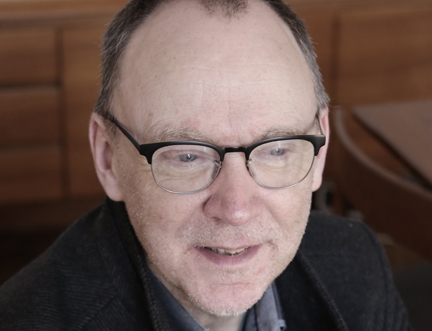More articles Monday 21 August 2017 3:30pm
Gerry Hassan & Michael Keating on the Future of Scottish Politics at the Book Festival

Political commentator Gerry Hassan says there is a “deceit” at the heart of Scottish politics about “claiming we are a social democracy”, while the Unionist-versus-Nationalist dynamic is “trench warfare, a war of attrition” that is harming public debate.
“In case no one’s noticed, social democracy is actually in crisis across the Western World, in retreat, even in the Nordics,” he told the Book Festival. “Maybe we need to think beyond social democracy before we’ve even got there in a sense. And we have to have an honest assessment and awareness of the Scottish public sphere, Scottish public life…it can’t be about certainty.”
Hassan said public discourse should instead focus on “the conditional politics of independence versus the conditional politics of the Union”, which he believed would be more “intellectually honest, stimulating, open minded”, not “not about giving yourself to the politics of faith of independence or the Union. And that means we need to identify, champion and give voice to that middle Scotland, people who don’t have certainty.”
Hassan, author of Scotland the Bold and editor of A Nation Changed? The SNP and Scotland Ten Years On, was in conversation with Professor Michael Keating, editor of A Wealthier, Fairer Scotland, about the future of Scottish politics following the independence referendum, Brexit and the recent UK General Election.
Professor Keating said that after last year’s EU referendum, the UK was now facing “that sort of existential question about what kind of society we’re going to look like”. And, he added, “the idea that somehow you’ll find your independence and then be able to do whatever you like is as illusory as it is in Scotland. We’re in a complicated world where power is in multiple places…[we’re having] the wrong kind of debate.”
But, said Keating, devolution had “been enormously positive” for Scotland, although Hassan believed there had been too much focus on the Scottish Parliament, which he described as a bit of “an empty vessel”.
Asked about recent statements from former SNP leader and First Minister Alex Salmond, which some believe are unhelpful to his successor Nicola Sturgeon, Hassan said: “Yeah, Alex Salmond is a problem, in fact, Alex Salmond has always been a problem. Alex Salmond, a Marmite politician in the indyref, lots of people love him, lots of people can’t stand him, we all have Alex Salmonds in our life, those relatives who have just too good a conceit of themselves.
“But why Salmond matters here [is] we’re operating in a little bit of a vacuum, an age of uncertainty…and what’s aided that vacuum is since the indyref there’s been a failure of leadership on the part of the SNP, and central in that has been Nicola Sturgeon. The SNP has never privately or publicly said ‘we lost’ and then had a post-mortem…and if those things had been different then Alex Salmond’s vaudeville show would probably still be taking place, but it would have less political ripples. It has ripples because there’s silence where there shouldn’t be silence.”
And responding to last week’s Book Festival debate about the word “nationalism” and Ms Sturgeon’s suggestion that she would like to change the name of her party, Professor Keating said: “The Unionist parties say ‘we don’t believe in nationalism’ but they’re nationalist parties, British nationalist parties.
“The debate in Scotland on independence has come to dominate politics despite the fact that on almost every other issue the parties in Scotland agree completely, they only disagree about the framework in which this kind of society should be realised, whether it’s Scotland, the UK or European, and this is really quite frustrating and gets in the way. We can’t get rid of the nation, but if all politics become ways of rehearsing the nation then that does cause us to lose sight of these other big issues.”

 Major new partnership with Celtic Connections
Major new partnership with Celtic Connections 

